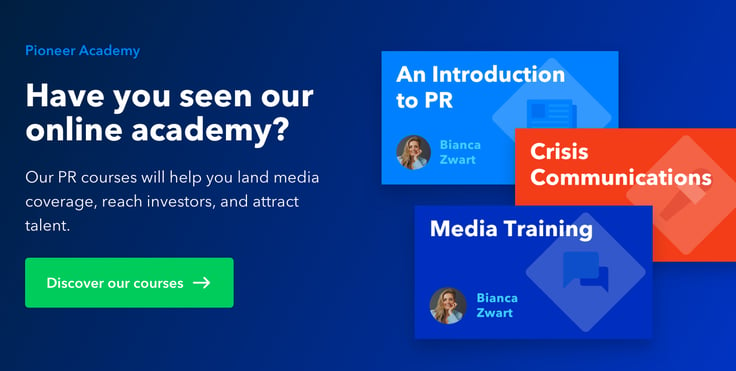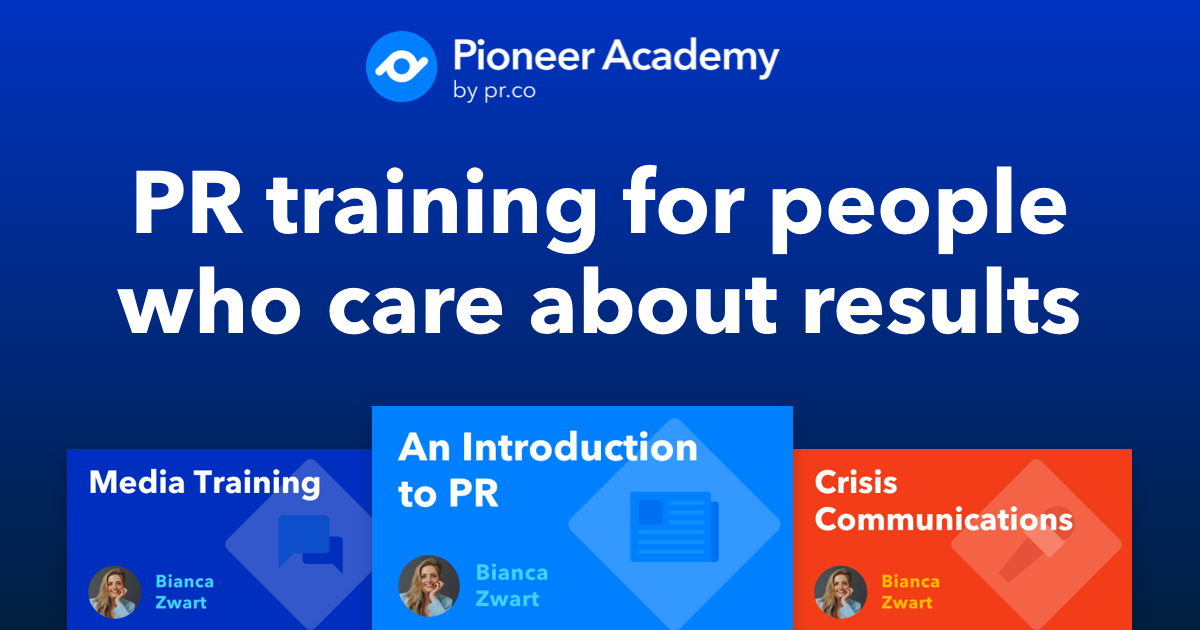Bianca Zwart cut her professional teeth as Head of PR at bunq. Now, with her own agency catering to reality-changing startups, she shares lessons on challenging the status quo and what that means for PR professionals.

Your PR agency Black & White Communications only works with ‘reality-changing startups’. What do you mean by this?
Reality-changing startups are companies that don’t accept reality as it is. They believe real change is only possible if it releases the old, limiting reality and its accompanying thinking. Take for example Boyan Slat with his Ocean Cleanup. Instead of finding a slightly better place to dump plastic in the ocean, he decided to change the reality and clean up the ocean, by reusing and recycling ocean plastic.
A lot of companies imagine their new company based on an old reality and by doing that they just create another extension of something or simple improvements instead of fundamental change.
If we take the reality we believe in as a starting point for change and improvement, then at most we can reach a reality which is slightly better than the old one. A slightly better product or a slightly better service, but not a fundamentally different one.
With bunq we imagined a completely new banking reality and we introduced a completely mobile bank that makes life easy by focusing on its end user's best interests instead of the banks. We introduced banking as a service again, instead of this overly complicated system that uses your money to make money.
It gives you freedom of choice to decide what happens with your money. This means that you can decide where your funds are stored and how they are used. We didn’t want a bank that will peddle your private information to the highest bidder like all other banks. That’s simply something we wouldn’t do.
There’s a great book on this, 'From Big Ideas to Giant Leaps', by Jenny Elissen, which introduces a new way of looking at reality.
.jpg?width=736&name=336925-IMG_1000-0af90c-original-1572367547%20(1).jpg)
Why do you think so many industries are being disrupted right now (banking being a great example)
Most of these disrupting startups have one common value- transparency- because it's lacking in traditional companies.
What are the challenges of kicking back at established norms?
You can’t take things personally. Kicking back at the establishment is not a startup's main challenge, because as soon as you have your disruptive product you’re automatically challenging the establishment. The real challenge lies in daring to communicate differently.
When I worked with bunq for example, we would sometimes get comments like "Oh, my bank shouldn't speak like this. Why is my bank using emojis?" But it's really important to define your values and stick to them regardless of what people are saying. If you're changing the energy of an industry with your company, there are going to be people that hate you, because people are uncomfortable with change. But it’s actually a good sign: because if nobody hates you, you're doing something boring.
We really have this vision of what a completely new banking reality looks like, so what we’re building takes their wishes into account but doesn’t sacrifice this vision. Otherwise, you wouldn’t disrupt a thing. Disruption is uncomfortable.
It's refreshing to hear because everything is so data-driven that companies tend to do what they think people are going to like, rather than coming up with anything fresh. This can make communications efforts feel unoriginal.
At bunq of course we listen to our users. But we don't follow absolutely everything they say. There’s a famous Thomas Ford quote about innovation “If I had asked people what they wanted, they would have said faster horses.”
We really have this vision of what a completely new banking reality looks like, so what we’re building takes their wishes into account but doesn’t sacrifice this vision. Otherwise, you wouldn’t disrupt a thing. Disruption is uncomfortable.
Right, so you are treading the line between courage and empathy.
Yes. You’re empathetic as a brand because your users are the people who are going to use your product. It's not like you're looking for people to hate you, but you shouldn't be caught off guard if they do.
On the flip side, we also have a lot of passionate advocates in our userbase and that's something that only happens organically if you are doing something different. There are real bunq fans out there who open up merchandise shops with bunq logos, shirts, and mugs. Who would have predicted that you could feel so passionate about your bank?
.jpg?width=736&name=336926-IMG_0972-cdcc66-original-1572367579%20(1).jpg)
What techniques do you use to place new ideas at the forefront of industry conversations?
In the first years of a startup, you should really focus on yourself instead of focusing too much on your competitors. This is what we do. Just let them do whatever they do. Always talk from the context of your own strength rather than pointing fingers.
It's funny because we actually like seeing a lot of FinTech players in the banking space. We see them as our peers. We’re in this together, we are trying to change a whole industry and we probably would not be able to do it alone.
So you’re not just doing PR for yourself, you’re doing PR for a whole new category?
Exactly. There's so much happening in industries being disrupted. And even journalists are finding out what it all means and how exactly to write about it. How do you measure its success? A lot of people are signing up for new apps, but are they actually using the new tools that are emerging? Do they trust them yet? It’s a really interesting game because I personally try to feed journalists new information as they are working it out in real-time.
When you introduce a company, it's really important to look at what the old reality was, what the new reality is, and how you'll make the future different. Because if you don't do this beforehand, then other people define your value.
How do you reclaim the narrative when people misunderstand?
It's really important to not defend yourself. Because if you defend yourself you are inadvertently agreeing with the fact you’ve done something wrong. So instead we focused on showing our enthusiasts more of the new products. And that paid off. Sometimes you just have to pick your battles. It’s about showing people the value of what you have just introduced and letting your audience figure it out themselves.

What else do you wish you'd known when you started in PR?
In the beginning, I found everything scary; I was scared to send a story out, I was scared of public opinion. Now, I embrace public opinion, comments, and critics. I love them. It’s all valuable information that you can learn from. If they talk about you, you're interesting enough. I’d rather have that than a really positive article on a website that no one reads.
Also, if you work with a reality-changing organization, it's important not to make 3-year communication plans like big corporations do. Just devise a strategy and accept that it isn't fixed. There's so much happening and your company will be changing every week. If you can accept that then you can work your way around it and use change as an asset.
Mike Tyson once said "Everybody has a plan until they get punched in the face.” You get punched in the face a lot when you’re changing realities, so it's best to just have something simple that works.
I usually have a strategy for a quarter. And if I measure the results at the end of that quarter, and those results are not what I want them to be, I'll change the strategy again. It doesn't mean that your company's values change, it's just the way you relate to what's happening out there in the market, to the things you're introducing, and to your competitors.
we actually like seeing a lot of FinTech players in the banking space. We see them as our peers. We’re in this together, we are trying to change a whole industry and we probably would not be able to do it alone.
Is the future of all industries disruption? Ie. will everything need to be innovated or will disruption remain niche?
I think there are a lot of industries that have not been disrupted yet that desperately need to be. Like the wedding industry. I have a client called wedoido. They came to me because the wedding industry isn't transparent in any way whatsoever. Anybody who has got married knows that.
You can't find any venue prices online and when you turn up and drop the word ‘wedding’, the prices magically double. Everything is online now. It is straightforward and quick to book your holiday and other services with clear prices but with weddings, this is near-impossible. This makes sense as they are playing on the emotions you have about your special day as a way of getting you to pay more. It's not user-centric in any way.
We did a lot of research on this industry, starting with a mystery shop. We contacted the most popular venues in the Netherlands. I created some fake aliases and emailed them; first, as a man wanting to celebrate his birthday, then as a couple wanting to get married. Same date, the same number of people.
And indeed, the prices for the ‘engaged couple’ magically doubled.
We got coverage in a lot of publications with that story, so we decided to do the same in the United Kingdom. And it was even worse. Our research in the UK was with the Telegraph, so a lot of people saw that story.
Saying that our industry has changed is an understatement. Here are 7 skills to master for the future of PR.
.jpg?width=736&name=336927-IMG_0950-787b60-original-1572367609%20(1).jpg)
If we’re talking about kicking the establishment, no one opens their mouth about the wedding industry because people want their wedding to appear perfect so avoid talking about their problems. Even companies themselves are scared of speaking up against big venues as they hold a lot of power.
So we do it for them. And a lot of venues were happy that we spoke up as they were also not happy with their industry, but they didn’t know how to fix it. So with PR you’re bringing real issues to light.
Do you think every industry should be innovated?
Ironically I don’t think PR should be innovated. Because it revolves around human relationships and storytelling, and I don't see that being automated anytime soon. It could be automated, but I wonder what the impact on human relationships would be. I focus more on strategy of course, and you can automate the way you reach out to people to save time.
You’re now doing PR in an agency rather than in-house. What are the differences you’re experiencing?
I started my own agency because I worked with many good agencies when I was in-house at bunq. But I noticed a lot of PR agencies can't keep up with the pace of startups. They're really good with big corporations, but they're not bold enough, or fast enough, or dedicated enough to work with startups.
That’s why I started my own agency, as it was something I found really important. I wanted to keep that startup mentality. So although I'm an agency, but I have a startup, in-house mentality. If you hire me it’s as if I’m a member of staff. I won't be physically there all the time but I will be dedicated. You can call me in the night, I don't care. I'd rather have that kind of relationship than this distance from the message.
PR is really important for startups when they really don't know what to do. But it's a really big step to hire a big agency- obviously because of the cost- but also because they don't usually give you the feeling that you're their one and only guy.

Why do you think some people misunderstand the importance of PR?
People think it's marketing or social media, which indeed is a part of it, but it's more than that. But I think the key reason is if you do it well, it seems effortless.
If you end up in TechCrunch for example, which is the holy grail for a lot of companies, people think that just happened organically. They have no idea of the work that was put in behind the scenes.
How do you research what's going on in the market?
Bianca has a wealth of experience in the PR industry. As founder of the PR agency Black & White Communications, she has worked for some of Europe's fastest-growing companies. As an entrepreneur herself, Bianca appreciates the unique needs of startup PR. She is currently Chief of Staff for bunq where she combines her strategic vision and creative operational vision to help driving bunq’s effort to radically change the banking industry.. Connect on LinkedIn or send an email







